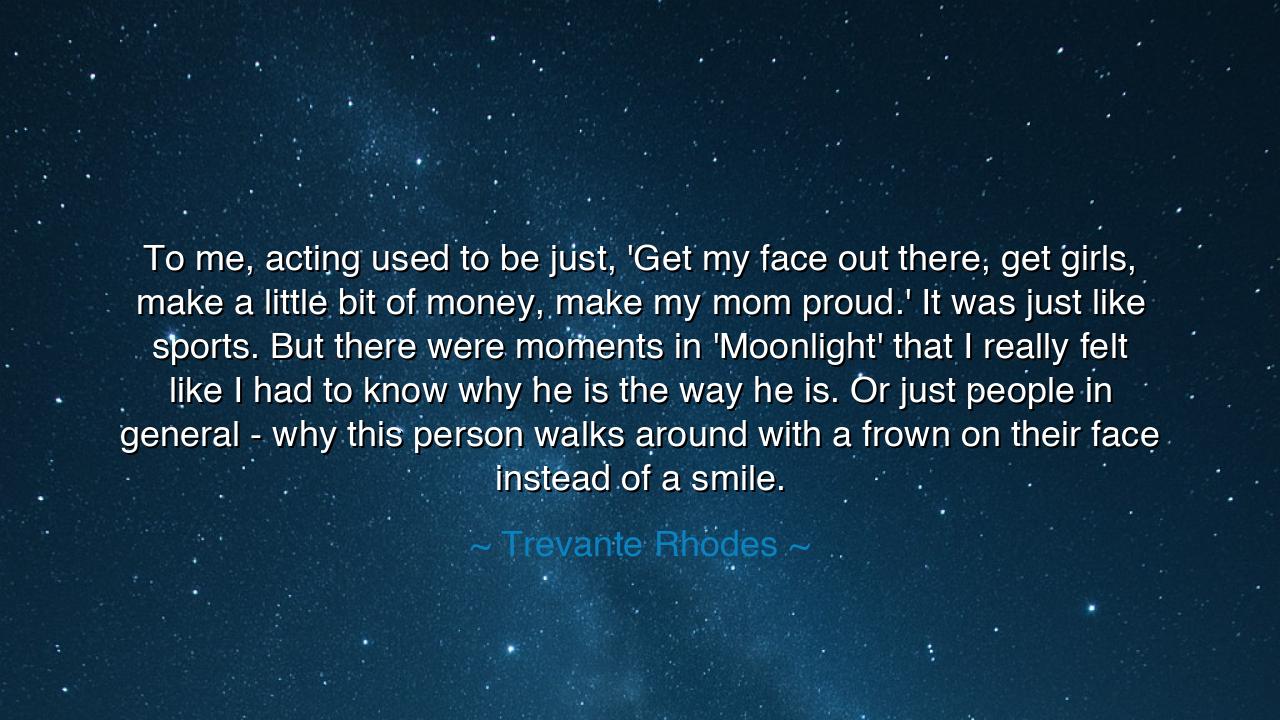
To me, acting used to be just, 'Get my face out there, get girls
To me, acting used to be just, 'Get my face out there, get girls, make a little bit of money, make my mom proud.' It was just like sports. But there were moments in 'Moonlight' that I really felt like I had to know why he is the way he is. Or just people in general - why this person walks around with a frown on their face instead of a smile.






In the words of Trevante Rhodes, spoken with the honesty of one who has walked both the shallow and the deep waters of his craft: “To me, acting used to be just, ‘Get my face out there, get girls, make a little bit of money, make my mom proud.’ It was just like sports. But there were moments in Moonlight that I really felt like I had to know why he is the way he is. Or just people in general—why this person walks around with a frown on their face instead of a smile.” Though these words may sound humble, they bear within them a transformation: the passage from self-interest to compassion, from vanity to understanding, from the outer mask to the inner soul.
In the beginning, Trevante’s approach to acting was like many youthful pursuits—chasing recognition, admiration, and reward. There is no shame in this, for such desires are the sparks that often ignite the first flames of ambition. Yet, ambition that feeds only the self soon burns out. Just as the athlete who plays only for applause soon tires, so too does the artist who seeks only the glitter of attention. The true fire comes when the art ceases to be about self and begins to be about others.
It was in the sacred story of Moonlight that Rhodes encountered this deeper current. For the character he portrayed was not merely a role, but a vessel of human truth—a man marked by pain, longing, and the silent weight of existence. To ask, “Why is he the way he is?” is not only the question of an actor, but the question of every seeker of wisdom. For what higher calling exists than to look upon a fellow being, not with judgment, but with the desire to understand their hidden burdens?
This echoes the teaching of the ancient philosopher Marcus Aurelius, who wrote that when one sees another behaving harshly, one must remember: “If you knew what was in their heart, you would pity, not condemn.” To seek the reason for a frown rather than despise it, to wonder why one withholds a smile—this is the seed of empathy, and empathy is the root of all enduring art and all lasting humanity. In this, Trevante Rhodes crossed the threshold from performer to storyteller, from athlete of the stage to healer of the soul.
History gives us examples of this same transformation. Think of Victor Hugo, who in writing Les Misérables sought not merely to entertain, but to awaken France to the plight of the poor, the orphan, the convict. His characters were drawn not to flatter readers but to make them ask, “Why does this person suffer? What silent battle do they carry?” So too did Rhodes find in Moonlight a mirror for this timeless work: to reveal the inner lives of those whom the world too easily overlooks.
The lesson, then, is that our work—whether in art, sport, or daily labor—must not remain bound to the surface. We must ask the deeper questions, not merely, “How does this benefit me?” but, “How does this reveal the hidden truth of others? How does this bring me closer to understanding the human condition?” In this lies both humility and greatness, for the one who seeks to understand others becomes larger than himself.
Therefore, let each who hears these words learn to look differently upon the faces they encounter. When you see a stranger’s frown, do not dismiss it, but ask quietly, “What story lies behind this?” When you meet a smile, remember it may be hard-won, carrying battles unseen. And in your own craft—whether you are an actor, a builder, a teacher, or a healer—strive not only to achieve but to understand, not only to shine but to illuminate.
For in the end, the greatness of Trevante Rhodes’s reflection is not that he found fame, but that he found empathy. And this is the wisdom that must be carried forward: the true measure of one’s art, and indeed of one’s life, is not how loudly the world applauds, but how deeply one sees into the heart of another.






AAdministratorAdministrator
Welcome, honored guests. Please leave a comment, we will respond soon